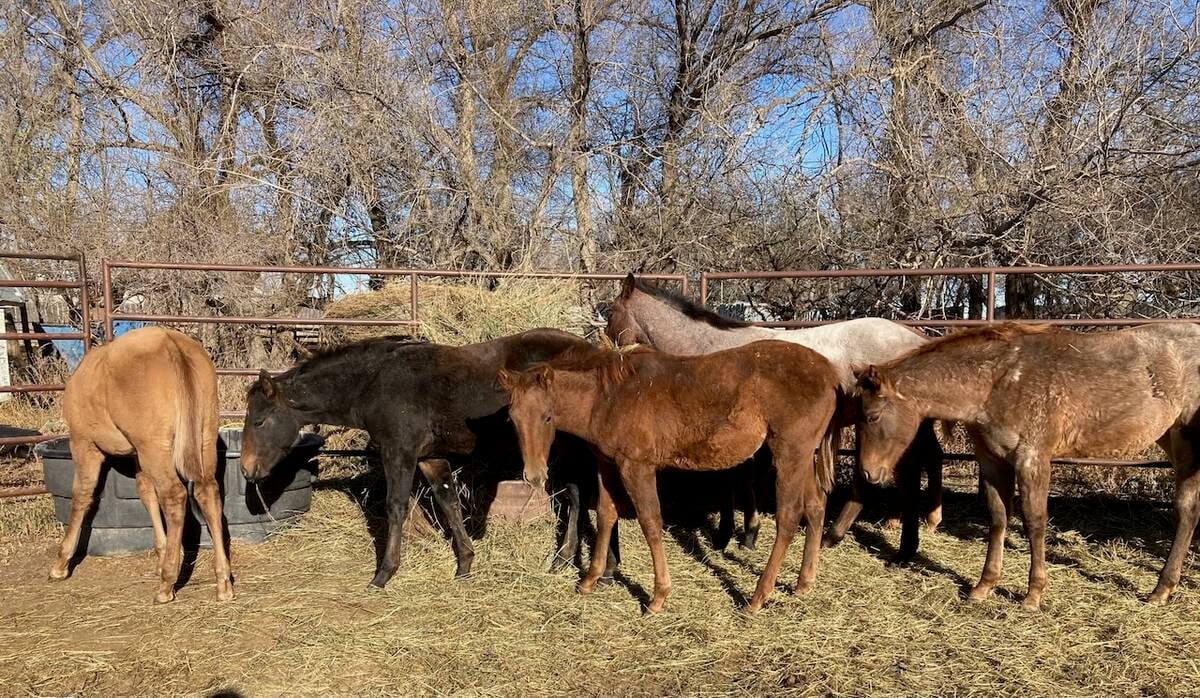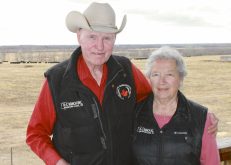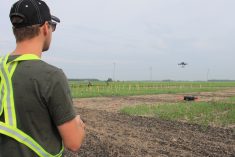Maggie Van Camp understands the challenges as well as the tremendous value of farm succession planning. She’s been on that road a couple of times in her life as a seventh-generation Ontario farmer, as well as a communicator and agricultural consultant.
The first time was after the sudden death of her husband in a farming accident about 10 years ago. In their early 40s, the farming couple had already discussed and began the farm succession planning process, just as a matter of good business practice.
“It was about a year and a half after my husband died — probably the most difficult period of my life,” she says. “We had three young children, I had a farm to run and I had to look after this transition of the farm. It was a difficult time. I’m dealing with grief, and the key decision maker of the farm business has died.
Read Also

Fall clean-up and bringing animals home at the Eppich ranch
Winter is approaching which meant emoving old fence rows and bringing livestock home before the cold and the snow at the Eppich family ranch.
“Fortunately, we had gone through farm succession planning. And we had a really strong partnership agreement that dealt with things such as death, divorce, disability and other circumstances.
“I am near the end of the transition process and I remember coming home from a meeting with the lawyer. It was a cool rainy day in March and I sat in my office, looking at the rain, thinking about the transition process and it struck me just how terrible this whole business would have been if we had not had a farm succession plan in place. It was still a very difficult time, still a lot of work, but it would have been absolutely terrible had we not had a succession plan in place.”
The second time she’s had to deal with farm succession planning comes now, as the farm looks to develop a succession plan that involves her children — one of whom is seriously interested in taking over the cash crop and poultry operation. So that planning process is underway.
Her personal experience is just one of the motivators that led Van Camp, through her communications and consulting company Loft32, to develop a program or process for farm business transition planning, called Farmer’s Bridge.
“I empathize with people,” says Van Camp. “Succession planning isn’t something that people always want to talk about, it isn’t easy, they may not know where to start. But it is such a necessary part of the farm business. It is so important. financially and personally, to have an orderly plan in place for the transition of farm ownership and management to the next generation.
“And that’s what Farmers’ Bridge is about. It is just a step-by-step, easy-to-understand, online, work-at-your-own-pace program that can lead a farm family through the succession process. It gets you started.”
And it’s not just online videos. Farmers’ Bridge is meant to help connect farmers to a wide range of farm business specialists anywhere in the country, to help people navigate the succession process.

Free introduction
To mark the launch of the program, Farmers’ Bridge is inviting farmers to a free webinar called Farmers’ Bridge: Shift from Family to Business Conversations, on March 19 at noon ET. Anyone interested is asked to register via email and will be sent a password and guaranteed a space in the webinar.
“The farm succession process eventually involves financial and legal matters,” Van Camp says. “But what is really important and where it really begins is with communications. It is about farm family members talking to each other.
“In our case it started with family meetings. We didn’t just one day sit down and start talking about who wants what and how do we handle transition. But it was sitting down with the family and finding out what they were thinking, what their interests were, what were their plans? The whole planning process will likely take several years, but in my case I asked our kids for what I call a deadline of intent.
“At our family meetings we talked about are you planning to go to school; are you interested in farming; depending on their age, are they thinking of getting married someday? It was about getting a sense of where everyone is at and some idea of a timeline for the next few years.
“And it involves the whole family. Our second family meeting was chaired by my 15-year-old daughter. We have an agenda, we have a code of conduct, and we talk with each other.”
Van Camp has a very complementary skill set as she talks to farm families about farm succession. She has been involved in farming all her life, still serving as an owner and CEO of the family farm near Blackstock, Ont. So she knows that business. Also, over the years she got involved in communication. Back in the day she was an editor and writer with Grainews and later served as senior business editor with Canada’s national agricultural magazine, Country Guide.
More recently, she was BDO’s national director of agriculture, where she led sector marketing and industry relations. She also revitalized the accounting firm’s social responsibility program, worked closely with its business transition team and built a strategic organization of ag teams from coast to coast.
About six years ago, Van Camp and longtime friend and business associate Crystal Mackay launched Loft32, the communication, consulting and leadership training company which this year launched Farmers’ Bridge.
Plans to change hands
It’s always a good time to talk about farm succession planning, but recent surveys show it’s not something to be neglected. Over the next 10 years, 40 per cent of Canadian farms will change hands — and about two-thirds of those farms do not have a succession plan in place.
“I’ve talked to people and written about farm succession planning for years,” Van Camp says. “It is a topic people choose to avoid. It sounds complicated and it can be. They don’t understand the lingo or the terminology, they may not know who to talk to. They are just reluctant to start. And it’s from that viewpoint we’ve developed Farmers’ Bridge. It is bite-size, it is easy to understand, and it gets people started.”
Online courses
Farmers’ Bridge involves on-demand video training described as a convenient way for farmers and their families to learn. Currently, two courses are available on the learning platform Utensil.ca, with plans for more. The first course is about some of the basics of farm business transition; the second is a series of short three- to five-minute videos on a range of succession planning topics from the financial side as well as the communication side. Topics include the difference between succession, transition and estate planning; Canada’s lifetime capital gains exemption; farm rollover rules; the difference between working capital and current ratio; four financial ratios you need to know for farm business transition planning; why communicating with family about business is difficult; overcoming resistance; how to have difficult conversations; and the difference between conflict and fighting — among others.
The Farmers’ Bridge courses lay the groundwork, but the program is also meant to help farmers connect with business transition specialists in real time in all parts of the country, including specialists in mediation, counselling, transition planning, financial planning, coaching and tax and legal advice.
And if you want to bring some of this experience to a local farm organization or community group, for example, Loft32 has set up a team of succession-passionate speakers for such events.
“These are experts from all parts of the country that will come to a meeting in your area to inspire, inform and motivate farm transition planning,” Van Camp says. “On request we can put together proposals for keynote speakers, panel moderators, and workshop leaders.”
Is it expensive to use such specialists to develop a farm succession plan? It can seem so. The first two Farmers’ Bridge courses come in a bundle that costs $249, for example.
“Developing a farm succession plan does cost money,” Van Camp says. “But when you consider what is at stake it is really not significant. You look at the value of your farm business and learn about the tax and legal implications of transitioning that business to the next generation. The advice of a good accountant alone can save the business perhaps hundreds of thousands of dollars. The cost of developing a proper succession plan is well worth the investment.”
To introduce people to Farmers’ Bridge, the March 19 webinar is planned as a fun and intense 20 minutes with Van Camp along with coach and facilitator Patti Durand, discussing common ways they’ve seen people derail their family businesses with their words.
More importantly, they share habits of effective family business communications that farmers can start using immediately.
“A properly planned and executed farm succession plan also provides great peace of mind,” Van Camp says. “I always say one of the important markers in life is to develop a succession plan in such a way that the grandparents still get to see the grandkids for Christmas dinner. No animosity, no hard feelings; it is a plan that helps keep the family together.”
And on a personal note, Van Camp says, maybe you also sleep a little better at night.
As farm management and operation is transitioned to her son, “just recently for the first time in about 23 years, I don’t have a poultry barn alarm beside my bed,” she says.
“It is not like I was regularly called out in the middle of night because the alarm went off. I wasn’t. But the responsibility was there. But as we work through the transition, it is now someone else’s responsibility. I don’t have an alarm anymore. That letting go takes a bit to get used to. But it is good. I know the farm is in good hands.”















